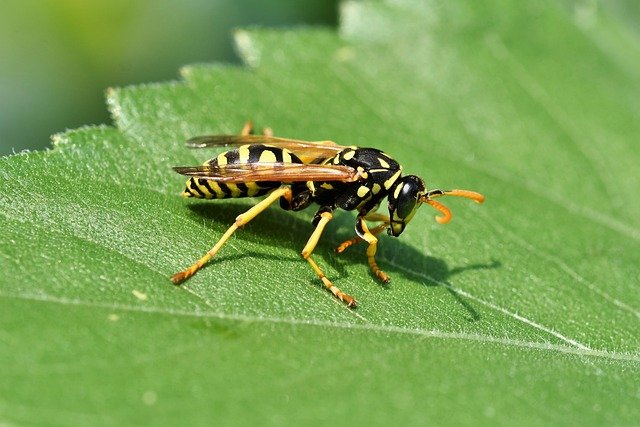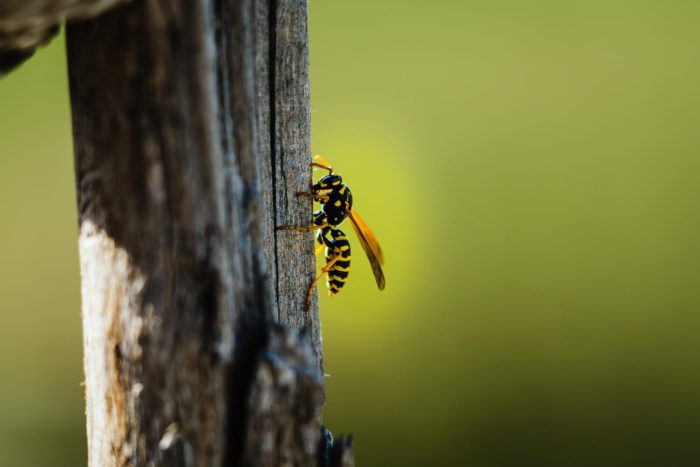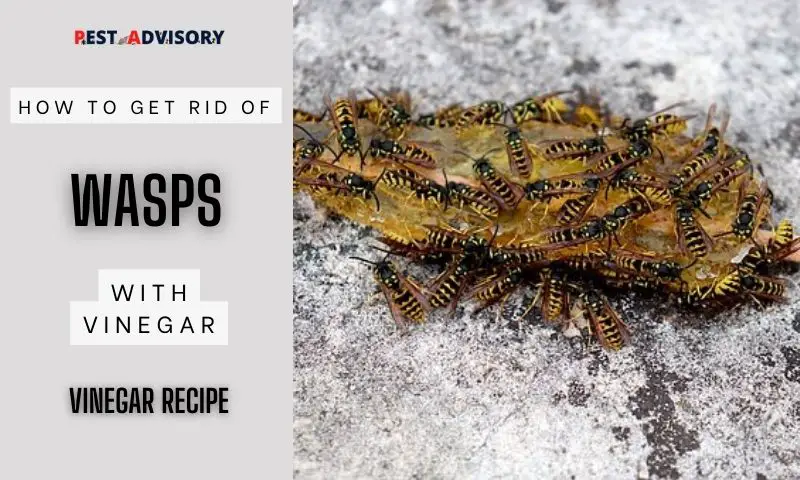Wasps can be a nuisance and sometimes even dangerous if you are allergic to their sting.
You might have learned that using vinegar is a safe and efficient technique to get rid of wasps.
In this post, we’ll answer a few common inquiries regarding using vinegar to keep away and kill wasps, as well as provide you with a step-by-step method for manufacturing your own acetic wasp-repellent spray.
Important Note: If you're tired of pests and want a reliable solution, then you should definitely consider seeking help from a professional pest control company. DIY solutions can be effective, but if you're dealing with a significant pest infestation, you don't want to rely solely on DIY methods. Pest control companies typically don't charge huge fees. You can fill out this form to receive free quotes from the top local pest control companies, and compare the quotes and see for yourself. Then, finally, your pest problems will be eliminated for good.
Does Vinegar Keep Wasps Away?
Yes, vinegar can help keep wasps away. The pungent odor of vinegar could mislead wasps, making it harder for them to return to their nest. Vinegar can also repel other insects such as ants and flies, making it a versatile household ingredient to have on hand.

How to Get Rid of Wasps with Vinegar
Let’s talk about ways to use vinegar efficiently now that we know it can help repel wasps. Vinegar can be used to repel wasps in two ways: as a repellant spray and in a wasp trap.
Use Vinegar Wasp Repellent Spray
Ingredients
- 2 cups apple cider vinegar
- 1 cup of water
- 2 cups of sugar
- ¼ to ½ cups of dish soap
Instructions
- In a large mixing basin, combine 2 cups apple cider vinegar and 1 cup water.
- Stir 2 cups of sugar until the sugar is completely dissolved in the vinegar and water combination.
- Add 14 to 12 cups of dish soap to the mixture and gently stir until thoroughly blended.
- Fill a spray container halfway with the mixture and shake vigorously before using.
- Wear protective clothing such as long sleeves, pants, and gloves.
- Locate the wasp nest or area where the wasps are gathering.
- Spray the vinegar and water mixture directly onto the wasp nest or the area where the wasps are gathering.
- Repeat this process daily until the wasps are gone.
Simply spray the wasp-repellent spray in areas where wasps are common, such as around windows, doorways, and outdoor eating areas.
Use Vinegar Wasp Trap
Ingredients
- A shallow dish or jar
- White vinegar
- Liquid dish soap
- Sweetener (optional)
Instructions
- Pour enough white vinegar into the dish or jar to cover the bottom.
- Add a few drops of liquid dish soap to the vinegar and swirl gently to combine.
- If desired, add a sweetener such as sugar or honey to the mixture to attract more wasps.
- Place the vinegar wasp trap in an area where you have seen a lot of wasp activity. Wasps will be attracted to the scent of the vinegar and will crawl into the trap.
- Check the trap regularly and empty it when it becomes full of dead wasps.

Frequently Asked Questions
Does Vinegar Kill Wasps?
While vinegar may repel wasps, it is not an effective method for killing them.
In fact, spraying vinegar directly on a wasp may even anger it and cause it to become more aggressive.
If you have a major wasp infestation or a nest on the premises, you need to call an expert pest control agency.
Is vinegar safe to use around pets and children?
Although vinegar tends to be safe for use around pets and children, it is always best to safeguard them out of the area when spraying the mixture.
You should also keep the spray container in a secure and safe location.
How long does it take vinegar to get rid of wasps?
Vinegar is not an instant killer of wasps, and it might take some time to eliminate them using vinegar.
When sprayed on wasps or their nests, the vinegar solution will repel them or make them uncomfortable, and they will avoid the treated areas.
However, it might take several applications of the vinegar solution over a few days to completely get rid of the wasps.
Can I pour vinegar on a wasp nest?
It is not recommended to pour vinegar on a wasp nest as it may harm them instead of getting the task done and could potentially anger them, causing them to attack.
Additionally, vinegar has a strong acidic smell that could attract more wasps to the area.
It is best to use vinegar as a lure in a trap near the nest or use alternative methods such as soap and water or seek professional help to safely remove the nest.
Do you put vinegar or baking soda on a wasp sting?
It is not recommended to use vinegar on a wasp sting as it may increase the pain due to its acidic nature, which could exacerbate the alkaline venom that wasps inject into the skin.
Baking soda or sodium bicarbonate, a basic material that can help neutralize the alkaline nature of the poison and lessen the discomfort and swelling, is a common home treatment for wasp stings.
So, you should use baking soda on a wasp sting instead of vinegar.

Conclusion
Wasps are nuisance pests! It can be a bother to deal with wasps hovering in or near your home.
And, what’s worse is that wasps are notorious for stinging a couple of times!
This time, you know that you can use vinegar as a natural and effective way to get rid of wasps bothering your day-to-day living.
So, we hope that you’ve taken note of the method of using vinegar as an effective repellent. Remember, be wary of wasps! Using vinegar is a must.
As a precautionary measure for future infestation, you can plant wasp-repelling plants that help to keep wasps away, in your garden or surrounding your home.
Thanks for reading!

